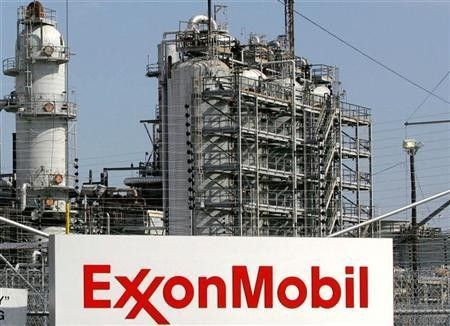Exxon Mobil Shuts Louisiana Oil Pipeline After Leak

(Reuters) - Exxon Mobil Corp has shut the 160,000 barrel-per-day (bpd) North Line crude oil pipeline in Louisiana after a leak spilled 1,900 barrels of crude oil in a rural area over the weekend, affecting a conduit that supplies the nation's third-largest refinery.
The 22-inch line originates in St. James, Louisiana, and provides shippers with access to oil from the giant Louisiana Offshore Oil Port and crude from offshore platforms, according to Exxon's website.
It was unclear Monday, the second full day the North Line was shut, how long it might be down. The line pumps crude to ExxonMobil's 502,000 barrel per day (bpd) Baton Rouge, Louisiana, refinery as well as a handful of other plants.
The U.S. pipeline regulator said it had sent an inspector to investigate the leak, but has not issued any orders that would prevent Exxon from resuming operations when it is ready. The company said it had contained the oil in the immediate area.
Prior to resuming operation, the failed section of pipeline will need to be repaired and tested in accordance with PHMSA safety requirements, Jeannie Layson, a spokeswoman for the Pipeline and Hazardous Materials Safety Administration, said in a statement. At this time, PHMSA has not issued any enforcement orders to the operator requiring restart approval.
A spate of recent leaks and incidents has heightened local concerns and prompted calls for tougher scrutiny from regulators. Last July, Exxon' Silvertip pipeline spilled about 1,000 barrels of oil into the Yellowstone River in Montana, an accident that the company said cost it about $135 million.
The leaks are only one-tenth the size of a large spill that occurred on an Enbridge Inc line in July 2010, prompting a massive cleanup effort. That line remained shut for over two months of testing and repair.
My guess is unless PHMSA is lowering the boom on Exxon, they will be operating the south end of the North Line soon, said a source familiar with the matter. That will mean that Baton Rouge, Placid and Krotz Springs will be unaffected.
A crude shipper said Exxon had offered no hints on the line's return.
There are no guesses from Exxon as to when they will restart at this time, the shipper said.
In addition to the Baton Rouge refinery, the nation's third largest, the pipeline provides crude to other refineries including Alon USA Energy's 80,000 bpd Krotz Springs, Calumet Specialty Products 57,000 bpd Shreveport, and Placid Refining's 57,000 bpd in Port Allen, all in Louisiana; and Delek's 75,000 bpd El Dorado in Arkansas.
The North Line also feeds crude to the Mid-Valley Pipeline.
Exxon Mobil spokeswoman Rachael Moore said a cleanup of the spill site near Torbert, Louisiana, began on Sunday.
Fortunately the oil was contained in the immediate area which will enhance our recovery efforts, Moore said.
Exxon said it had shut the pipeline late on Saturday after it detected a drop in pressure.
REFINERY IMPACT
Exxon spokeswoman Rachael Moore said the pipeline shutdown had no immediate effect on production at the Baton Rouge refinery. The refinery is also supplied by crude from tankers on the Mississippi River.
Alon was seeking more information from Exxon about the outage, a company spokesman said on Monday.
We're looking to Exxon Mobil for more information on the incident to determine what, if any, impact this will have on production (at the Krotz Springs Refinery), said Alon spokesman Blake Lewis.
The Krotz Springs Refinery has crude waiting to be offloaded from barges on the Atchafalaya River to make up for lost supply on the pipeline, according to a source familiar with refinery operations.
The Placid Port Allen refinery also receives crude oil from the Red Stick pipeline and from ships on the Mississippi.
The Calumet refinery in Shreveport can also receive supply from the Plains All American Pipeline system.
The Delek refinery in Arkansas can take crude from the Mid-Valley Pipeline operated by Sunoco Logistics.
Shares of Exxon closed up less than 1 percent at $86.34 per share.
--
© Copyright Thomson Reuters 2024. All rights reserved.




















